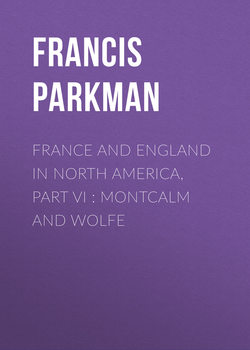France and England in North America, Part VI : Montcalm and Wolfe

Реклама. ООО «ЛитРес», ИНН: 7719571260.
Оглавление
Francis Parkman. France and England in North America, Part VI : Montcalm and Wolfe
PREFACE
INTRODUCTION
MONTCALM AND WOLFE
Montcalm and Wolfe. Vol. 1
CHAPTER I. 1745-1755
CHAPTER II. 1749-1752
CHAPTER III. 1749-1753
CHAPTER IV. 1710-1754
CHAPTER V. 1753, 1754
CHAPTER VI. 1754, 1755
CHAPTER VII. 1755
CHAPTER VIII. 1755-1763
CHAPTER IX. 1755
CHAPTER X. 1755, 1756
CHAPTER XI. 1712-1756
CHAPTER XII. 1756
CHAPTER XIII. 1756, 1757
CHAPTER XIV. 1757
CHAPTER XV. 1757
Montcalm and Wolfe. Vol. II
CHAPTER XVI. 1757, 1758
CHAPTER XVII. 1753-1760
CHAPTER XVIII. 1757, 1758
CHAPTER XIX. 1758
CHAPTER XX. 1758
CHAPTER XXI. 1758
CHAPTER XXII. 1758
CHAPTER XXIII. 1758, 1759
CHAPTER XXIV. 1758, 1759
CHAPTER XXV. 1759
CHAPTER XXVI. 1759
CHAPTER XXVII. 1759
CHAPTER XXVIII. 1759
CHAPTER XXIX. 1759, 1760
CHAPTER XXX. 1760
CHAPTER XXXI. 1758-1763
CHAPTER XXXII. 1763-1884
APPENDIX
Appendix A
Appendix B
Appendix C
Appendix D
Appendix E
Appendix F
Appendix G
Appendix H
Appendix I
Appendix J
Appendix K
Francis Parkman
Отрывок из книги
The names on the titlepage stand as representative of the two nations whose final contest for the control of North America is the subject of the book.
A very large amount of unpublished material has been used in its preparation, consisting for the most part of documents copied from the archives and libraries of France and England, especially from the Archives de la Marine et des Colonies, the Archives de la Guerre, and the Archives Nationales at Paris, and the Public Record Office and the British Museum at London. The papers copied for the present work in France alone exceed six thousand folio pages of manuscript, additional and supplementary to the "Paris Documents" procured for the State of New York under the agency of Mr. Brodhead. The copies made in England form ten volumes, besides many English documents consulted in the original manuscript. Great numbers of autograph letters, diaries, and other writings of persons engaged in the war have also been examined on this side of the Atlantic.
.....
It was heavy work to carry the cumbrous load of baggage across the portages. Much of it is said to have been superfluous, consisting of velvets, silks, and other useless and costly articles, sold to the King at enormous prices as necessaries of the expedition.127 The weight of the task fell on the Canadians, who worked with cheerful hardihood, and did their part to admiration. Marin, commander of the expedition, a gruff, choleric old man of sixty-three, but full of force and capacity, spared himself so little that he was struck down with dysentery, and, refusing to be sent home to Montreal, was before long in a dying state. His place was taken by Péan, of whose private character there is little good to be said, but whose conduct as an officer was such that Duquesne calls him a prodigy of talents, resources, and zeal.128 The subalterns deserve no such praise. They disliked the service, and made no secret of their discontent. Rumors of it filled Montreal; and Duquesne wrote to Marin: "I am surprised that you have not told me of this change. Take note of the sullen and discouraged faces about you. This sort are worse than useless. Rid yourself of them at once; send them to Montreal, that I may make an example of them."129 Péan wrote at the end of September that Marin was in extremity; and the Governor, disturbed and alarmed, for he knew the value of the sturdy old officer, looked anxiously for a successor. He chose another veteran, Legardeur de Saint-Pierre, who had just returned from a journey of exploration towards the Rocky Mountains,130 and whom Duquesne now ordered to the Ohio.
Meanwhile the effects of the expedition had already justified it. At first the Indians of the Ohio had shown a bold front. One of them, a chief whom the English called the Half-King, came to Fort Le Bœuf and ordered the French to leave the country; but was received by Marin with such contemptuous haughtiness that he went home shedding tears of rage and mortification. The Western tribes were daunted. The Miamis, but yesterday fast friends of the English, made humble submission to the French, and offered them two English scalps to signalize their repentance; while the Sacs, Pottawattamies, and Ojibwas were loud in professions of devotion.131 Even the Iroquois, Delawares, and Shawanoes on the Alleghany had come to the French camp and offered their help in carrying the baggage. It needed but perseverance and success in the enterprise to win over every tribe from the mountains to the Mississippi. To accomplish this and to curb the English, Duquesne had planned a third fort, at the junction of French Creek with the Alleghany, or at some point lower down; then, leaving the three posts well garrisoned, Péan was to descend the Ohio with the whole remaining force, impose terror on the wavering tribes, and complete their conversion. Both plans were thwarted; the fort was not built, nor did Péan descend the Ohio. Fevers, lung diseases, and scurvy made such deadly havoc among troops and Canadians, that the dying Marin saw with bitterness that his work must be left half done. Three hundred of the best men were kept to garrison Forts Presquisle and Le Bœuf; and then, as winter approached, the rest were sent back to Montreal. When they arrived, the Governor was shocked at their altered looks. "I reviewed them, and could not help being touched by the pitiable state to which fatigues and exposures had reduced them. Past all doubt, if these emaciated figures had gone down the Ohio as intended, the river would have been strewn with corpses, and the evil-disposed savages would not have failed to attack the survivors, seeing that they were but spectres."132
.....